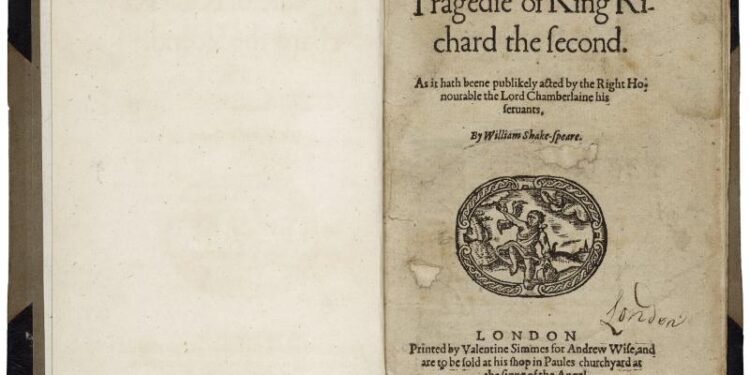Table of Contents
ToggleIntroduction
Richard II Play By William Shakespeare Summary And Themes Richard II, written by William Shakespeare around 1595, is one one of the first plays in the Henriad, a series of historical plays about the English monarchy. The play explores the themes of kingship, power, legitimacy, and the consequences of misrule. It focuses on the reign of King Richard II, the last Plantagenet king of England, who was overthrown by his cousin Henry Bolingbroke, later Henry IV. The drama showcases the downfall of a monarch whose idealism and weakness lead to political chaos, a transition from medieval ideals of divine right kingship to a more modern, pragmatic conception of power.
Richard II Play By William Shakespeare Summary And Themes The play delves deeply into issues of personal identity, political legitimacy, and the tension between the divine right of kings and the forces of rebellion. At its heart, Richard II is a tragedy about a ruler whose sense of self is so wrapped up in the symbolism of kingship that he loses sight of the practicalities required to rule effectively.Richard II Play By William Shakespeare Summary And Themes

Plot Summary
Act 1: The Dispute Between Richard and Bolingbroke
Richard II Play By William Shakespeare Summary And Themes The play opens with a dispute between Richard II and his cousin, Henry Bolingbroke, the Duke of Hereford, over the confiscation of Bolingbroke’s inheritance. Bolingbroke’s father, the Duke of Gloucester, has been murdered, and Bolingbroke believes that Richard, as king, either directly or indirectly played a role in the death. Richard, the reigning monarch, is depicted as a self-absorbed king who is more concerned with his image and power than with resolving this conflict or ensuring justice.
Richard II Play By William Shakespeare Summary And Themes The king decides to exile both Bolingbroke and the former Duke of Mowbray, who is accused of treason in connection with the Duke of Gloucester’s death. In the trial, Richard’s behavior alienates many of his nobles, including Bolingbroke’s supporters. Bolingbroke is exiled for ten years, while Mowbray is exiled for life.
However, shortly thereafter, Richard embarks on a political decision that will undermine his reign. He makes the rash decision to seize the property of Bolingbroke’s father, the Duke of Lancaster, to fund a military campaign in Ireland. This action further diminishes his support among the nobility, leading to widespread dissatisfaction with his leadership.
Act 2: Bolingbroke’s Return and the Decline of Richard’s Power
Richard II Play By William Shakespeare Summary And Themes While Richard is away in Ireland, Bolingbroke returns to England, initially to claim his inheritance and seek revenge on those who have wronged him. However, upon his return, he quickly garners support from the discontented nobles who are dissatisfied with Richard’s rule. Bolingbroke’s cause is fueled by his political legitimacy as the rightful heir to his father’s estate.
When Richard returns from Ireland and learns of Bolingbroke’s rebellion, he is shocked by the speed and strength of the challenge to his authority. Richard’s sense of kingship is rooted in the divine right to rule, and he struggles to understand how his own people, particularly the nobles, could turn against him. Despite his previous mistake of alienating his supporters, Richard is initially reluctant to take direct action.Richard II Play By William Shakespeare Summary And Themes
Act 3: Richard’s Capture and Bolingbroke’s Rise to Power
Richard’s refusal to act decisively only serves to weaken his position further. As Bolingbroke’s forces continue to grow, Richard’s loyal supporters abandon him, and he is eventually forced to surrender. Bolingbroke confronts Richard and demands that he abdicate the throne.
Richard II Play By William Shakespeare Summary And Themes Richard, having already lost much of his power and dignity, agrees to step down, though he remains convinced of the divine nature of his kingship.Richard II Play By William Shakespeare Summary And Themes
Richard II Play By William Shakespeare Summary And Themes In a famous moment, Richard renounces his kingship and gives up the crown, which Bolingbroke claims as his own. Richard, now a powerless figure, is taken prisoner. The formal abdication of Richard II and his surrender to Bolingbroke is one of the most important moments in the play. Richard’s regal language and poetic speeches in the face of his downfall underline his internal conflict and his sense of personal tragedy.
Act 4: The Imprisonment and Death of Richard
Richard II Play By William Shakespeare Summary And Themes As Bolingbroke ascends to the throne as Henry IV, Richard is held in the Tower of London. The former king’s mental state deteriorates, and he speaks in anguished, philosophical terms about the loss of power and identity. Richard’s language becomes more introspective and lyrical, revealing his despair over his fall from grace.
Eventually, Richard is murdered under suspicious circumstances, though the true nature of his death remains ambiguous. His death symbolizes not only the loss of a king but the final destruction of the medieval ideal of kingship based solely on divine right.Richard II Play By William Shakespeare Summary And Themes
Richard II Play By William Shakespeare Summary And Themes The play ends with Henry IV solidifying his claim to the throne and preparing for the political challenges of his reign. Richard’s death and the changing of the guard signify a shift in English political life, as the turbulent years that follow will be marked by the instability of the Lancastrian dynasty and the eventual rise of the Tudors.
READ MORE
Themes in Richard II
- Kingship and Political Legitimacy
Richard II Play By William Shakespeare Summary And Themes One of the central themes of Richard II is the nature of kingship and the legitimacy of political authority. Richard’s belief in the divine right of kings makes him an idealist, but his failure to govern effectively leads to his downfall. By contrast, Bolingbroke, though initially exiled, is able to claim the throne because he has the support of the nobility and the people. This shift from an idealized notion of kingship to one rooted in practical power and political support reflects the changing political landscape in England during the late Middle Ages.
- The Divine Right of Kings
Richard II Play By William Shakespeare Summary And Themes Richard II’s belief in the divine right of kings is another key theme in the play. Richard believes that his authority as king comes directly from God, and thus he sees any challenge to his rule as a challenge to the will of God. His reliance on this idea of divine authority blinds him to the realities of political power. Richard’s downfall comes when he fails to recognize that political power is not only granted by divine right but must also be supported by the people and the nobility.Richard II Play By William Shakespeare Summary And Themes
- Identity and Self-Perception
Richard’s sense of identity is deeply tied to his kingship. When he loses the throne, he loses his sense of self. This theme is most evident in Richard’s speeches, which are filled with reflections on the nature of power, the self, and the role of the king. Richard II Play By William Shakespeare Summary And Themes His loss of power leads to a spiritual crisis, and his introspection underscores the tragedy of his downfall. By contrast, Bolingbroke’s ascent to the throne is marked by pragmatism and self-assurance.Richard II Play By William Shakespeare Summary And Themes
- The Nature of Power and Corruption
Richard II Play By William Shakespeare Summary And Themes The play explores how power is often tied to corruption and betrayal. Richard’s abuse of his authority, his inability to recognize his own failings, and his detachment from the concerns of the kingdom make him an ineffective ruler. On the other hand, Bolingbroke’s rise to power is marked by cunning and ambition. The play suggests that political power is fragile, easily corrupted, and dependent on the support of the people and the nobility.
- Fate and Free Will
Richard II Play By William Shakespeare Summary And Themes The play also explores the tension between fate and free will. Richard’s downfall is in part due to his own choices, such as his decision to alienate the nobles and his failure to address the political crisis that was unfolding in England. However, the play also suggests that Richard’s fate was sealed from the moment he inherited the crown, as his character and temperament were ill-suited to the demands of kingship.
- Rebellion and Loyalty
Rebellion and loyalty are explored through the characters of Bolingbroke and the various nobles who support him. While Bolingbroke initially seems like a man seeking revenge, he also represents the desire for stability and the maintenance of order. Richard’s downfall is precipitated by the disloyalty of his nobles, who abandon him for Bolingbroke.Richard II Play By William Shakespeare Summary And Themes

Character Analysis
- King Richard II: Richard is an idealistic, poetic, and self-centered monarch. His belief in the divine right of kings and his neglect of the practical needs of governance lead to his downfall. He is a tragic figure, whose personal flaws and misjudgments prevent him from retaining power and respect.Richard II Play By William Shakespeare Summary And Themes
- Henry Bolingbroke (Henry IV): Bolingbroke is Richard’s cousin and the central figure of the rebellion. His rise to power represents the triumph of pragmatic politics over the idealized notion of kingship that Richard represents. Bolingbroke is portrayed as a more grounded, capable leader, though his own ambitions and ruthlessness foreshadow the turbulent reign of Henry IV.
- John of Gaunt: The Duke of Lancaster and Bolingbroke’s father, John of Gaunt is a wise and noble figure who represents the old order. His famous speech on the state of England in Act 2, Scene 1, underscores the play’s concerns with national identity and the decline of the monarchy.Richard II Play By William Shakespeare Summary And Themes
- Duchess of Gloucester: Though she does not appear extensively, the Duchess plays a significant role in the backstory, driving Bolingbroke’s desire for revenge. Her grief over the death of her husband and the subsequent political machinations add depth to the play’s exploration of betrayal and justice.Richard II Play By William Shakespeare Summary And Themes Richard II Play By William Shakespeare Summary And Themes
Conclusion
Richard II Play By William Shakespeare Summary And Themes Richard II is a profound exploration of kingship, power, and identity. Through the tragic arc of Richard’s downfall, Shakespeare critiques the divine right of kings and presents a political world where power is contingent on the support of the people and the nobility. The themes of rebellion, loyalty, and fate are woven into the play’s examination of personal and political identity, making Richard II a timeless reflection on the fragility of power and the complexity of leadership.Richard II Play By William Shakespeare Summary And Themes
(FAQ)
Q1: What is the significance of Richard II’s abdication?
Richard II’s abdication marks the collapse of the medieval concept of divine right kingship, where the monarch was seen as God’s appointed ruler. His voluntary abdication is an acknowledgment that power is not divinely bestowed but must also be supported by political realities.
Q2: Why does Bolingbroke rebel against Richard II?
Bolingbroke rebels against Richard II primarily due to personal grievances. Richard’s mismanagement of the kingdom, particularly his seizure of Bolingbroke’s inheritance and the death of Bolingbroke’s father (which Richard is indirectly blamed for), motivates his rebellion. Bolingbroke sees himself as a legitimate heir to the throne and a necessary force for stability in the kingdom.
Q3: How does Richard II address the theme of identity?
The theme of identity is central to Richard II. Richard’s sense of self is tied to his kingship, and his loss of the throne leads to his personal crisis. Bolingbroke’s rise to power marks the beginning of a new political era, where kingship is based on practical considerations rather than divine right.
Q4: What role does fate play in Richard II?
Fate plays an important role in the tragedy of Richard II. While Richard makes choices that contribute to his downfall, there is also a sense that his fate was inevitable due to his character flaws and the broader political forces at work. The play suggests that fate and free will are intertwined, and that individual actions can still be shaped by larger forces.
Q5: What is the historical context of Richard II?
Richard II is set during the reign of Richard II, who ruled from 1377 to 1399. The play is loosely based on historical events, particularly Richard’s deposition by Bolingbroke, who became Henry IV. The play dramatizes the political instability of the time and the complex relationships between monarchy, nobility, and the people.Richard II Play By William Shakespeare Summary And Themes
READ MORE
















